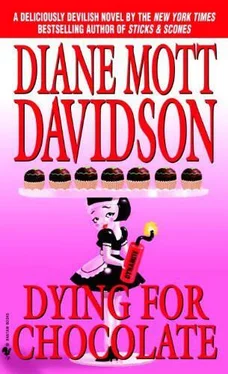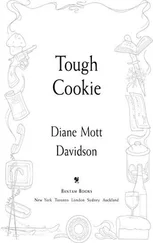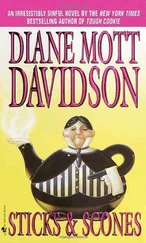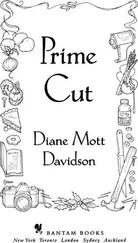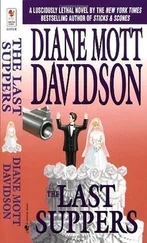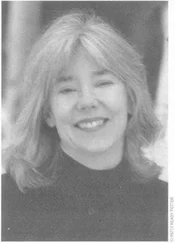“What’s the general doing? Putting in a gold mine?”
“No, a garden.”
She shook her heavy cheeks. “Too bad he’s never gone hand to hand with The Jerk.” She giggled and sat down next to me in a flurry of feathers and sequins. She said, “There are a lot of people we should call. About Philip.”
I nodded. In Aspen Meadow you had to call people in times of crisis. You had to let them know they’d be needed. She found pencil and paper and asked for numbers, which I read to her from our slender town phone book. At Elizabeth’s house she got the answering machine. Next she tried a neighbor of Elizabeth’s in the hope that we could get somebody to be with her. There was no answer. Marla then tried Aspen Meadow Health Food. She told the clerk what had happened, asked her to put up a sign closing the place for the next few days, and left our numbers to be called.
When I had finished the coffee we put away the food Marla had purchased: there was enough for several days. She asked me about the evening meal. Chicken salad, in the refrigerator. I could not imagine eating. I looked at my watch.
Where was Arch?
“Goldy.” Marla touched my shoulder. “What is it?”
“Find out where Arch is,” I said in a whisper.
Marla turned crisply and called the school, was put on hold, fumed and fussed, and eventually had an answer. She held her hand over the receiver. “Adele offered to bring him home when the general comes by later. But she’s not authorized to take him, so Arch is still there, and Adele is coming home early with somebody else. Want me to go?”
I shook my head and got on the phone with the minor bureaucrat, said General Farquhar would be by later and he had my authorization to pick up Arch.
Marla asked if I wanted more coffee or what. I shook my head as she took out lace place mats and English china for the evening meal, then searched out the general. I wanted Arch to be home. I wanted this day to be over. When Marla returned, she moved between the kitchen and dining room to set the table. I furiously began to wash the teacups. Work was always the best antidote for frustration.
Also the best antidote for . . .
With a pang I saw Philip’s face crinkled with laughter the last time we’d gone out. I’d told him Arch had bought a copy of The Anarchist’s Cookbook and refused to yield it to me when I’d demanded it. Philip had found this amusing.
“Censorship,” he accused. “Even if it is a cookbook.”
“For bombs,” I said. “I’m not sure the general’s influence is good for him.”
“You know as well as I do,” he said, “that the more upset you get about it, the more he’s going to want it. Just talk to him. Don’t lose your cool. He’s been in therapy; he can always go back. And you’ve got me.”
A teacup slid through my hands and broke to smithereens in the sink. Marla rushed over and ordered me to sit down. She said the general had gone in his Range Rover to check on the T-bird and get Arch. Just relax, she kept telling me, everything is going to be okay.
I looked out the west-facing kitchen window. Gray clouds had again billowed up over the mountains. On the hills below, lodgepole and ponderosa pines absorbed the sudden darkness. Stands of white-skinned aspens stood out like skeletons. The aspens’ tiny cupped green leaves held the light and turned a fluorescent lime color as the gloom gathered.
“Goldy!” Adele Farquhar’s voice rang down the hall. “Marla? Who’s here?” The wooden hall floor echoed her familiar tap-step, tap-step. “Where are you?” Adele appeared at the kitchen doorway. Her thin, made-up face was pinched into lines of dismay. Her strawlike hair, dyed dark to hide the gray and cut into a severe pageboy, set off her navy-blue silk dress. Her hand gripped her cane so tightly her knuckles were white. She swept forward to embrace me; her voice cracked. “Thank God you’re alive.”
“It was awful,” I said, my voice muffled by her shoulder. Adele smelled like floral powder mixed delicately with sweat. Her hair brushed my cheek; her pearls pressed into my neck. I could feel the bones of her thin shoulders under the layer of silk. After a moment I pulled away.
She said, “At the school they told us what happened.” She shook her head in disbelief, her hazel eyes filled with questions. “He was a nice man. And a good psychologist. It’s unbelievable. Philip was helping Julian so much . . . I don’t know. God! This weather’s so unpredictable.”
I looked at her, a taller, thinner, older version of Marla. She was glancing around the kitchen in a distracted way, as if something contained in the polished, professional space could provide the cure for cold spring weather.
Her eyes found her sister. “Marla!”
“It is I,” said Marla as she trundled forward and gave Adele a peck on the cheek. Sequins flashed against navy-blue silk. “I won’t be staying long,” she added apologetically. “I was just trying to help Goldy.”
“No, that’s fine, really. Stay. Where’s Bo now?”
Marla’s and my voices tumbled over each other as we told of the explosion and the general going for Arch.
“For heaven’s sake,” Adele said, shaking her perfect hair. She pulled herself up stiffly. “Let’s go out to the porch. You’ve had too much of a shock.”
“I’ll be going,” Marla said.
“You don’t have to,” was Adele’s halfhearted protest.
I looked from one to the other of them. This was the first time I had seen the two sisters together since Marla had introduced us a week ago, when I arrived. I had sensed some slight discomfort then, but I had put it down to the move. Where Marla was always full of news and information, a walking radio station in designer sweat suits, Adele was reserved, elegantly groomed, erect in a wardrobe that featured only natural materials: silk, cotton, linen, cashmere. It was more than the ten-year difference in their ages. My emotional antennae picked up on unresolved pain. I would have to ask Marla about it. But not now.
“Bye, everybody,” said Marla with a nod to us both. She whipped out the front door so quickly that I had only a moment to remember to press the button for the driveway gate. Her Jaguar revved, then growled down Sam Snead Lane.
“Let’s go outside,” Adele said. She turned and hobbled efficiently ahead of me to what the general called “the veranda.” “Poor Bo, I don’t know what he was thinking with that garden. I don’t want to know what the neighbors must think . . .” Her voice trailed off.
I whisked back to the kitchen to get a pitcher of water and two glasses, then rummaged through the kitchen desk to get Adele’s antiinflammatory and muscle-relaxant medicine. If I did not bring it with me, she would be asking for it once we sat down. I found them behind a tin of Julian’s fudge, which I put along with the pills, water, and glasses on a Florentine painted wood tray. Like the knickknacks and art objects in the living room, the tray was one of the many souvenirs of the Farquhars’ travels before Adele’s back problems had slowed them down.
On the covered porch it was quite chilly. Storm clouds still threatened to obscure the late afternoon sun. Adele gave me a wan smile and looked off toward the tops of the nearby mountains, where snow glimmered between the deep greens as incongruously as ice in a jungle. Next to the deck, birds—robins, jays, chickadees—were all busy, loud and angry at the weather for disturbing their nest-making. A jewel-winged hummingbird soared past, then swooped back to hover at the long-necked feeder.
“Water?” I asked. Adele nodded gratefully and reached for her pills.
I set the tray on the wicker coffee table, then let myself down into one of the wicker chairs. Again fatigue like a chill crept up from the floor. I sipped water, tried to shake the feeling off.
Читать дальше
